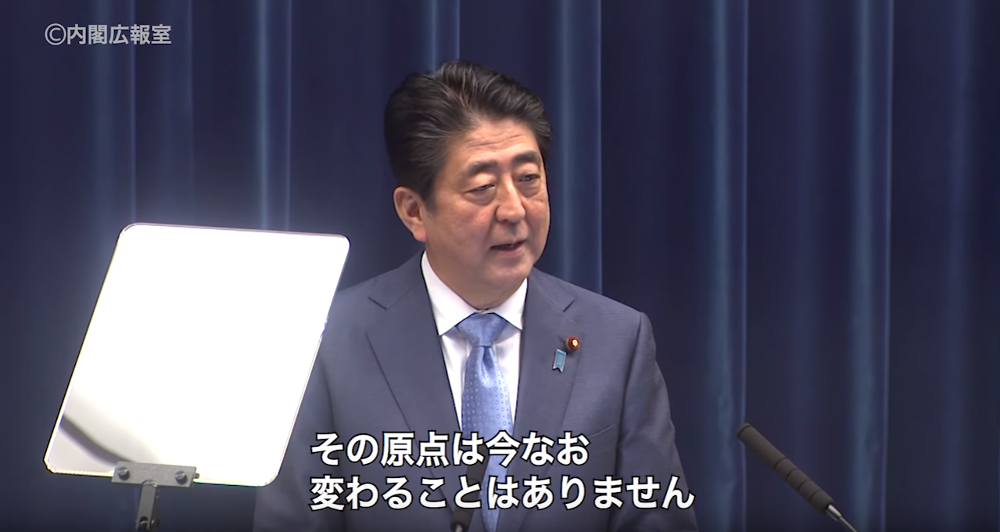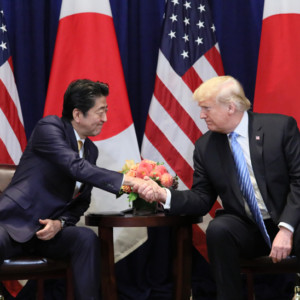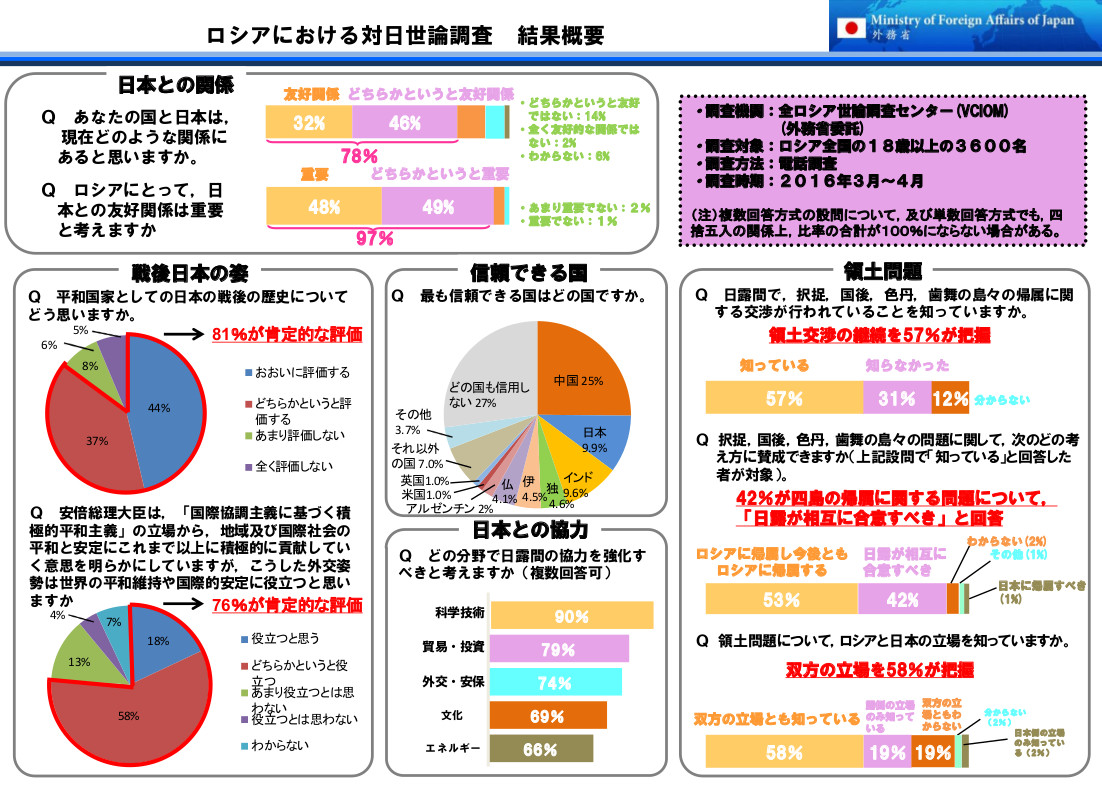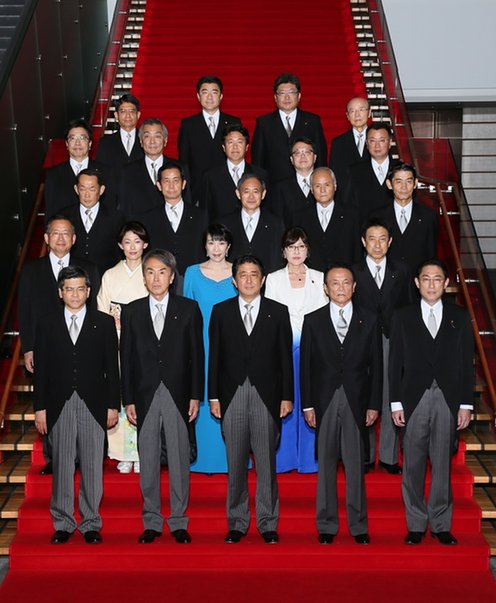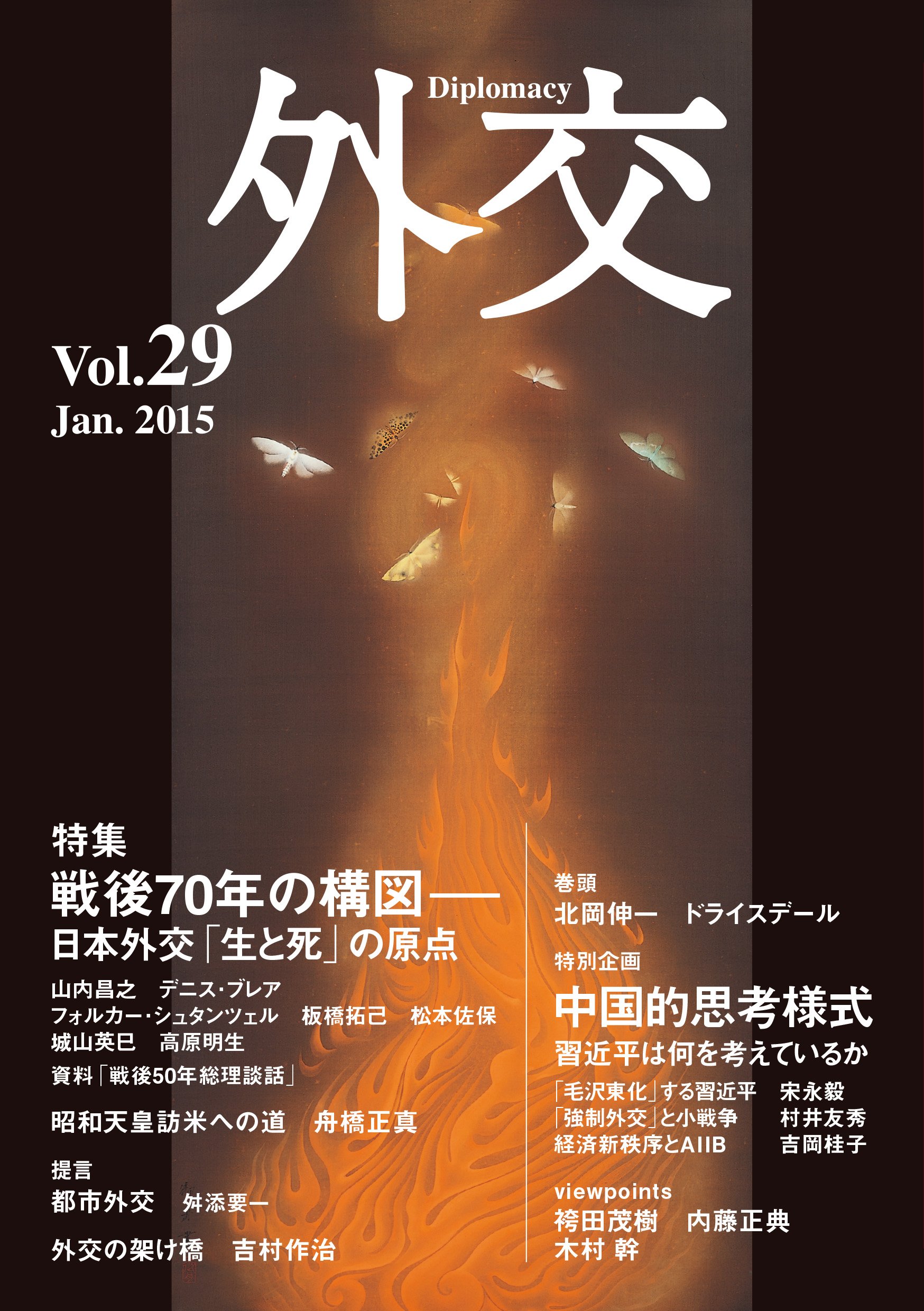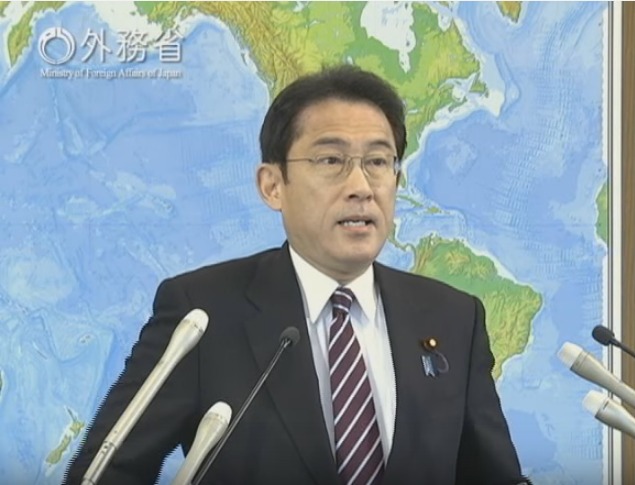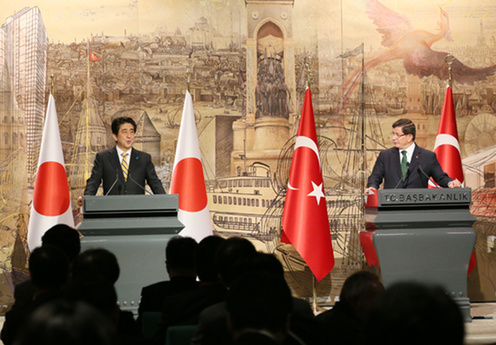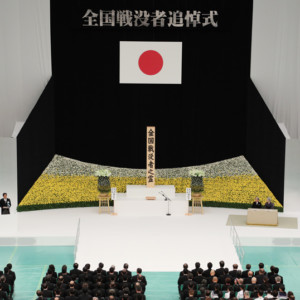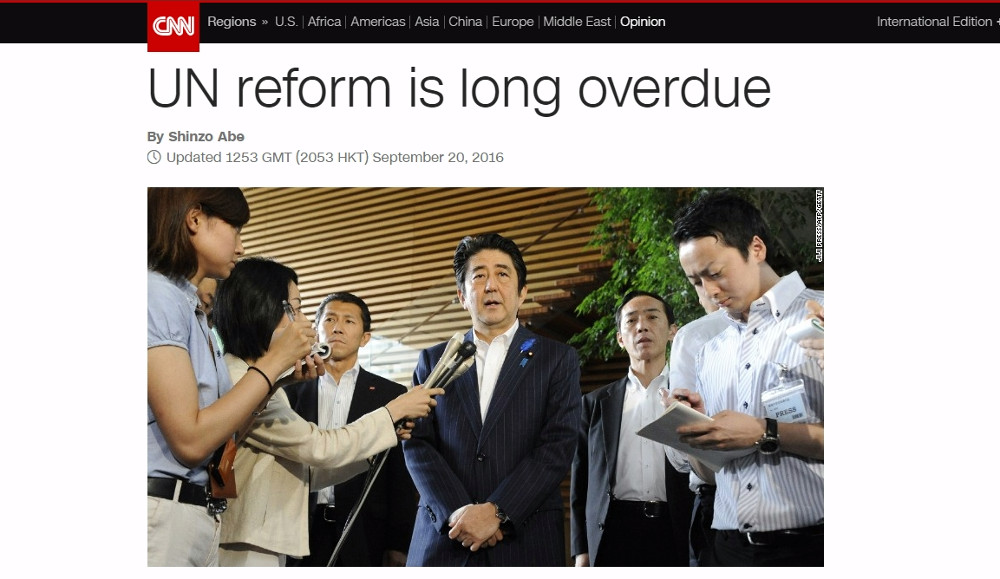
安倍首相がCNNへ寄稿、日本の常任理事国入りの必要性訴える<和訳・英文>
ページに広告が含まれる場合があります。

そうだ、大事なこと忘れてた。
安倍首相がCNNに寄稿し、日本の常任理事国入りを強く訴えているのでご紹介します。
|
国連総会に出席するためニューヨークを訪問していた安倍首相は、CNNに国連改革をテーマに寄稿した。
|
|
「国連組織改革の中でも安保理改革は急務である」としたうえで、北朝鮮の核や弾道ミサイルの問題をふまえ「国際の平和及び安全の維持に主要な責任を負う安保理の重要性は一段と高まっており、改革は待ったなしである」と述べた。
|
|
そのうえで「積極的平和主義を実践する日本が安保理常任理事国になることは、世界の平和と安全の大きな推進力になると確信する」と、日本の常任理事国入りを訴えた。
|
|
また、「『2023年までには、アフリカは常任理事国になるべきだ』という目標を強く支持した」とも述べた。
|
国連総会での安倍首相一般討論演説は下の記事です。
CNN(米国)への安倍総理大臣寄稿
(平成28年9月20日付)
「国連改革は待ったなし」
「今日世界が遭遇している不安と緊張の性質が如何なるものであろうとも,又その原因が如何なるものであろうとも,世界80か国の組織する国際連合の力によって,平和的に処理し得ない問題はあり得ないと信じます。」 60年前,日本が国際連合に加盟したその日に,当時外務大臣だった重光葵が述べた言葉である。本年の国連総会を目前に控える中,この言葉は1956年当時と同様,真実である。
国連は,創立後の70年余り,冷戦下の国際社会の対立を乗り越え,さまざまの地域紛争を解決してきた。今や,先進国・途上国の違いもなく,人々の往来は活発化し,貿易投資の自由化,情報通信技術の飛躍的進歩を享受し,多くの人々の生活を豊かにしている。
以来60年,日本は,国連を支える,太い柱であり続けている。日本が世界第2位の財政貢献国として国連に対し行ってきた貢献の大きさはその一つの証。国際社会の安定と平和のためには,加盟以来60年にわたり,3,300億ドルを超えるODAを実施し,途上国からの研修員の受入れ数は56万人に,日本からの専門家やボランティアの派遣は19万人に達していている。これらが如何に効果を上げたかは,今日,世界の成長センターに発展しているアジア諸国を見れば論を俟たないであろう。平和貢献の面でも,カンボジアや東ティモールのPKOへの要員派遣,そして,その後長年にわたる国づくり支援に尽力した。
しかし,現在の世界は,国連発足当時とは大きく変化した。同時に,このような国際社会のボーダレス化の進展は,人類に新たな難題をも突きつけており,国連が果たすべき役割もそれに応じて変化,進歩が求められる。急増するグローバルな危機を解決するため,国際社会は,「デバイディッド(divided)」ではなく,ますます「ユナイテッド(united)」でなければならない。カギとなるのは,時代遅れの国際社会における「縦割り(サイロ・アプローチ:silo approach)の打破」である。国際社会が直面する課題は,一つの国境の内側にも,また,一つの分野にも収まりきらない。難民問題に例をとると,問題は地理的・政治的に広がり,かつ長期化しており,根源にまで遡った解決策が求められる。目前の困窮から救う支援のみならず,彼らが自らの手で未来を切り拓く力を携えて故郷に戻ることができるよう,教育や職業訓練を含む支援も必要である。そこでは,人道と開発支援の連携が一層重要性を増している。
これらの難題に取り組むためには,国連の強いリーダーシップが不可欠だ。限りあるリソースの中,フルに役割を果たすためには,国連自身も縦割りを乗り越えなければならない。「一つの国連(One UN)」として,国連の各機関が協調し,組織としての一貫性を実現する他ない。そのためには,時として痛みを伴う大胆な組織改革も必要となろう。国連組織改革の中でも安保理改革は急務である。
混迷を極めるシリア,国連決議を公然と無視し,ミサイル発射や核実験を繰り返す北朝鮮といった喫緊の課題が山積する。特に,本年北朝鮮は2回の核実験を強行し,20発以上の弾道ミサイルの発射を繰り返し,その能力を向上させた。北朝鮮の核・ミサイルは新たな段階の脅威となっている。また,拉致をはじめとする北朝鮮の人権侵害は,地域の不安定化にもつながりかねず,国際の平和及び安全と不可分の問題である。国際の平和及び安全の維持に主要な責任を負う安保理の重要性は一段と高まっており,改革は待ったなしである。
国連創設以来,国際社会は地殻構造的に変化している。アジアやアフリカが独立を得て,加盟国の数も51から193になり,世界の政治・経済双方で存在感を増している。しかし,安保理の構成は,国際社会の平和と安全に主要な責任を負うにもかかわらず,70年前の国連創設当初の姿をとどめたままである。安保理の議題の多くを占める,アフリカですら常任議席を有していない。3週間前,ケニアで主催したTICADVIで,私は「歴史的不正義」を正したいというアフリカの願いに思いを馳せ,アフリカ諸国が自らまとめた「アジェンダ2063」を尊重して「2023年までには,アフリカは常任理事国になるべきだ」という目標を強く支持した。
何よりもまず,安保理が,より代表性が高く,正統性をもち,かつ実効的なものとならなければならず,安保理の構成も,それに相応しいものにしなければならない。安保理改革の必要性は国際社会のコンセンサスであり,改革への支持は,各国が国際の平和と安全を真に達成したいと考えているかの試金石である。同時に,今後を見通すと,先進国だけでなく途上国も共通した課題に直面しつつある。成長力を持つ経済構造,地球温暖化対策,化石エネルギーへの依存の低下,公害の防止,質と持続性能の高いインフラの構築,高齢化対応,保健機能の強化,教育インフラの整備などなど。日本は,戦後の荒廃から数十年間でこれらの難題を克服した実績を持ち,また,高齢者や女性の活躍を,今,最優先施策として進めている日本は,常任理事国の役目を引き受ける用意があり,日本だからこそできる国際社会への貢献があると確信している。
これまでも日本は自らの強みを活かし,国際社会の平和と安定に貢献してきた。唯一の戦争被爆国として,国連において,毎年,核兵器廃絶決議を提出するなど,軍縮・不拡散にも積極的に取り組んでいる。アフリカや中東を含めグローバルな観点から国際貢献を重ね,積極的平和主義を実践する日本が安保理常任理事国になることは,世界の平和と安全の大きな推進力になると確信する。
冒頭に紹介した重光による最初の国連演説の2か月後,内閣総理大臣に就任した岸信介は,就任に先立ち,「国連の権威向上と国連を通じての世界平和の確保のため,応分の寄与をなす心構えが必要」と説いている。私は,日本の国連加盟60周年にあたり,日本が国際社会の責任あるメンバー国として,国連が,時代の現状に合った,効果的な組織で在り続けるよう,積極的な役割を担い続けることを,改めて確認する。
出典:外務省
Prime Minister Shinzo Abe’s Article contributed to CNN
(September 20, 2016)
“UN reform is long overdue”
“Whatever may be the nature of the uncertainties and the tensions in which the world is placed today, and whatever may be their causes, there should be no problem that cannot be resolved peacefully with the united strength of eighty nations which now constitute our Organization.”
These words were spoken 60 years ago by Mamoru Shigemitsu, Japan’s foreign minister at the time, on the day our country joined the United Nations. His statement is just as true today, as we prepare for this year’s General Assembly meeting, as it was back in 1956.
In the 70 years since the United Nations was founded, it has helped the international community overcome Cold War tensions to resolve many regional conflicts. Today, in developed and developing countries alike, the greater movement of people, freedom in trade and investment, and advances in information technology have enriched many people’s lives.
Japan, for its part, has continued to serve as a steadfast pillar of the United Nations during its six decades of membership. We are, for example, the second-largest financial contributor to the United Nations, and have provided more than $330 billion of Official Development Assistance, accepted 560,000 trainees from developing nations and dispatched 190,000 experts and volunteers. Asian nations’ role as the growth center of the global economy is ample testimony to the impact these contribution have made. In addition, Japanese personnel have participated in peacekeeping operations in countries such as Cambodia and Timor-Leste and provided long years of on-the-ground support for nation-building programs.
But the world has changed drastically since the United Nations was established, and the evolution toward a borderless world is continuing, posing new challenges to mankind. It is therefore essential that the role of the United Nations evolves to meet those challenges. The international community must stand ever more united, not divided, to find solutions to these increasing challenges. And the key to doing so is to break down an outdated “silo approach” to international affairs.
The reality is that the issues we face are no longer one country’s problem, and they can no longer be confined to a single policy area. Tackling the prolonged refugee crisis, for example, which involves multiple regions and states, as well as complex political dynamics, requires a solution that gets to the root causes of a given issue. That means doing more than just saving refugees from the immediate crisis they find themselves in. Instead, we also need to empower them through education and vocational training so that they are ready to rebuild their lives if they choose to return home. This makes bridging the gap between humanitarian efforts and development assistance even more important.
But tackling such challenges requires strong leadership from the United Nations. The organization must live up to its full potential even as it faces finite resources in trying to do so. That will require making the United Nations a more unified organization — “One UN” — where UN bodies coordinate more closely. This process is unavoidable, even though it might require bold and painful organizational reforms. One of the most urgent of those is reform of the UN Security Council.
With a growing range of pressing issues to address, including the situation in Syria, as well as North Korea’s missile launches and recent nuclear tests in defiance of UN resolutions, the role of the Security Council continues to grow in importance. In particular, North Korea has enhanced its capabilities this year by conducting two nuclear tests and launching at least 20 ballistic missiles. Clearly, North Korea’s nuclear and missile threat has entered a new stage. Meanwhile, North Korea’s human rights violations, including the issue of the abductions of Japanese and other citizens, could undermine regional stability and thus should be seen as inseparable from matters of international peace and security. All this is a reminder that reform simply cannot wait, since the Security Council takes primary responsibility for the maintenance of international peace and security.
Since the United Nations’ inception, the international community has undergone tectonic changes. The number of member states has grown from 51 to 193 countries as Asian and African countries won their independence, gaining greater prominence on the international stage — both politically and economically – in the process.
Yet despite these changes, the composition of the Security Council, which has important responsibilities in terms of global peace and security, remains almost entirely unchanged. This means that the entire continent of Africa, which is the focus of many of the Security Council’s agenda items, does not have any permanent representation. With that in mind, three weeks ago, at the Sixth Tokyo International Conference on African Development I co-hosted in Nairobi, I expressed my firm support for the goal of having permanent African representation on the Security Council by 2023, while sharing their vision of correcting “historical injustice” and respecting their own initiative, “Agenda 2063.”
Clearly, a priority for the United Nations should be to address the composition of the Security Council to help increase its representativeness, legitimacy and effectiveness. There is a general consensus within the international community of the need for Security Council reform, and I see support for reforms as a litmus test of the seriousness of a nation’s desire for global peace and security.
Looking ahead, developed and developing countries alike face common challenges: building economic structures that drive growth, countering global warming while reducing dependence on fossil fuels and tackling pollution. Other shared goals include developing high quality and sustainable infrastructure, meeting the challenge of aging societies, and creating more robust health and education systems.
In a few short decades, Japan has successfully managed to overcome many of these issues. We are now also pioneering efforts to promote proactive engagement of our aging population, and to also create a society in which all women can shine. That is why I believe Japan can make a unique contribution to the international community, including through becoming a permanent member of the Security Council.
Japan has long drawn on its unique strengths to contribute to global peace and stability. As the only country to have experienced atomic bombings, we vigorously support nuclear disarmament and non-proliferation efforts, submitting resolutions at the United Nations every year calling for the eradication of nuclear weapons. Based on our track record of bringing a global perspective to resolving issues in Africa and the Middle East, among other regions, and our commitment to making a proactive contribution to peace, I firmly believe that as a permanent member of the Security Council, Japan would provide a major impetus toward global peace and security.
Just two months after Foreign Minister Shigemitsu delivered his country’s first speech to the United Nations, Nobusuke Kishi became Prime Minister. In a speech just before taking office, Kishi said: “Japan must always stand ready to make as much contributions as would be necessary to strengthen the authority of the United Nations and to attain world peace through the UN.”
On the 60th anniversary of Japan’s UN membership, I reaffirm this commitment — and our desire to fulfill our role as a responsible member of the international community, one that will continue to be proactive in working toward a United Nations that is effective and capable of keep pace with these fast-changing times.
出典:CNN

